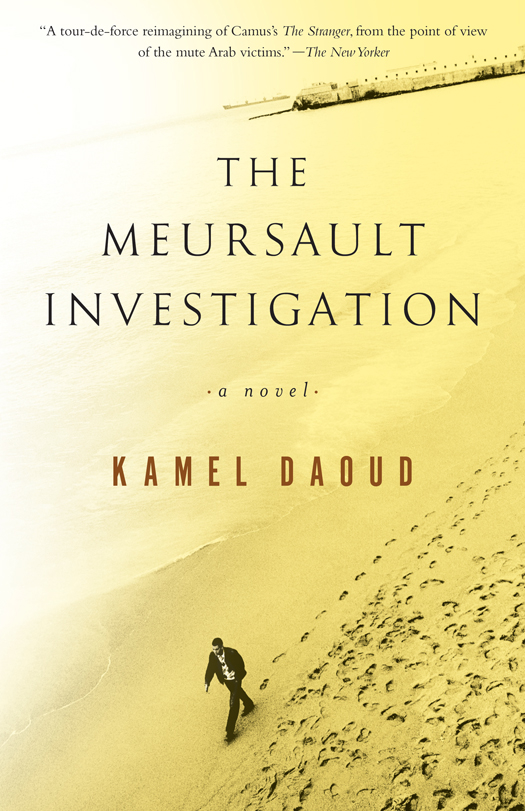
The Meursault Investigation
A Novel
کتاب های مرتبط
- اطلاعات
- نقد و بررسی
- دیدگاه کاربران
نقد و بررسی

Starred review from April 20, 2015
Camus’s The Stranger is vividly reimagined in Daoud’s intensely atmospheric novel (a finalist for the Prix Goncourt), which is told in a meandering monologue by the adult Harun, over the course of several visits to a bar in Oran, Algeria. Harun’s older brother, Musa, an Algerian Arab, was shot by the Frenchman Meursault on an Algiers beach in 1942; his body was never recovered. Musa’s missing corpse casts a long shadow over Harun, “condemned to a secondary role” by his widowed mother as she drags him on an interminable investigation into the death, taking the two from the Bab-el-Oued neighborhood of Algiers to the town of Hadjout, in northern Algeria. Determined to “organize the world” through language, the teenage Harun masters French in flashback, and he is 27 by the time a chance encounter offers him an opportunity to irrevocably alter his fate. As Harun meditates on guilt, alienation, and his failed affair with Meriem, a university student, his quarrel is revealed to be not just with his mother and Meursault, but with post-Independence Algeria and God himself. Ultimately, Harun identifies more with his brother’s killer than with his own zealous countrymen. The ghostlike “double” he sees in the bar where the tale is told may be Camus himself: “I’m his Arab. Or maybe he’s mine.” Daoud resists affirming which interpretation is “truer,” and readers will be captivated by the ambiguity.

May 15, 2015
The nameless Arab victim of Albert Camus' The Stranger receives a biography and a name in this thoughtful, controversial rejoinder from the other side of the colonial question. "Musa, Musa, Musa...I like to repeat that name from time to time so it doesn't disappear." So writes Algerian novelist Daoud, whose protagonist returns Camus' favor by skirting around the name and facts of his most famous book, except to complain that Musa is destined to "remain 'the Arab' forever." Meursault, Camus' murderer, is long dead, and so, of course, is Musa. Unlike Meursault's mother, though, Musa's is alive-ancient but alive-and still trying to get recognition as the progenitor of a martyr in the cause of Algerian independence. Alas, the bureaucracy is even more indifferent than Meursault. As for the brother/narrator, he's a barroom kvetcher and keeper of grudges who, like Meursault, can barely be moved to stir-until one day, some accident of fate compels him to act, finally, and take his lumps for it. The parallels between Meursault and him are numerous, and though the mood of Daoud's slender novel, originally published in French in 2013, is more plaintive, it is also grudgingly respectful toward its predecessor: "A masterpiece, my friend. A mirror held up to my soul and to what would become of me in this country, between Allah and ennui." It is for his sly insertions of religious questioning that Daoud has come under fire in his native country, having been the recent subject of a fatwa for venturing to suggest, in the final chapter, that the proper business of humankind is to tend to life on the mortal plane. Free-speech advocates may want to praise the author for his daring view on that matter, but this novel is praiseworthy enough as it stands. Fiction with a strong moral edge, offering a Rashomon-like response to a classic novel.
COPYRIGHT(2015) Kirkus Reviews, ALL RIGHTS RESERVED.

Starred review from June 1, 2015
"The original guy was such a good storyteller, he managed to make people forget his crime," says the narrator bitterly at the opening of this blazing, brilliantly conceived debut novel, which earned Algerian journalist Daoud a Prix Goncourt nomination--and a fatwa. Even if you ignore the title, it takes only a moment to realize that this work revisits Albert Camus's The Stranger from the Arab perspective. The narrator, Harun, recalls the murder of his older brother, Musa, who is all but anonymous in Camus's work, and the heavy consequences as their mother turns monstrous while investigating what happened and Harun wholly embraces life's absurdity and his own violent persona. VERDICT An eye-opening, humbling read, splendid whether or not you know and love the original.
Copyright 2015 Library Journal, LLC Used with permission.

























دیدگاه کاربران